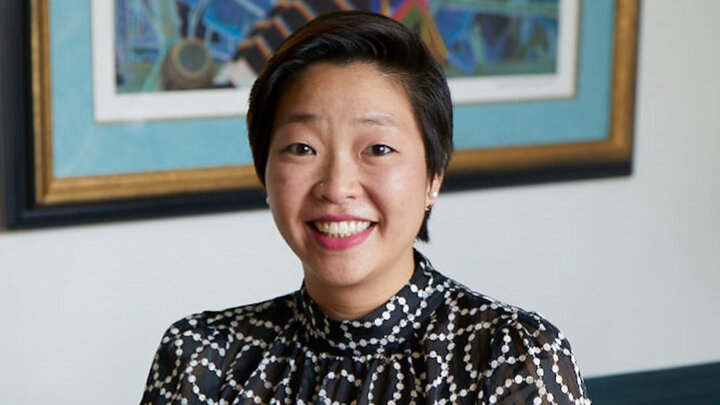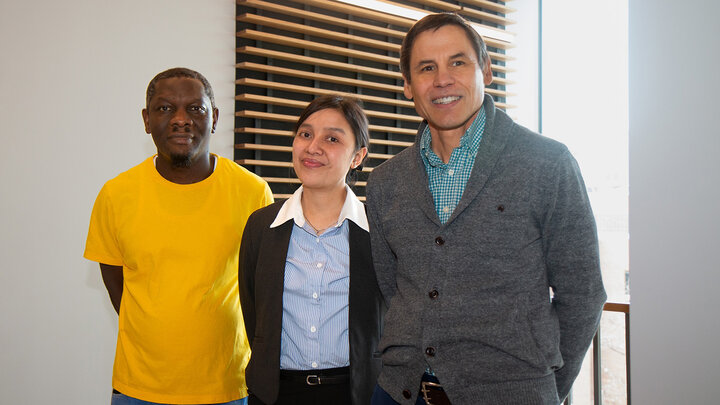Sherry Wang earned her master's degree in 2008 and her Ph.D. in 2013 in counseling psychology from the University of Nebraska-Lincoln. She currently serves as the associate dean of justice, equity, diversity, and inclusion at the School of Education and Counseling Psychology, as well as an associate professor of counseling psychology, at Santa Clara University. In this Q&A she shares about her experience in Nebraska's counseling psychology program.
Why did you choose Nebraska for your master’s and Ph.D. degrees?
I attended UNL to pursue my Ph.D in Counseling Psychology immediately after receiving my bachelor’s degree; I got my master’s degree along the way. I chose UNL because of my interest in immigrant and refugee mental health. I knew I had to pursue schooling at UNL because the state of Nebraska, and Lincoln, specifically, is one of the largest refugee resettlement sites. I pursued graduate training known that I wanted to specialize in immigrant and refugee communities. It was there that I learned about trauma-informed counseling, gained the theoretical and foundational knowledge to work with historically underrepresented and underserved groups, and developed the skills to be a scientist and practitioner specializing in multicultural counseling.
What set Nebraska's counseling psychology program apart for you?
I chose UNL’s counseling psychology program after comparing it to other doctoral programs. UNL offered the most encouraging, supportive, warm, experience—both my interactions with the faculty and the student community! This was consistently the case during my 7 years there pursuing my master's and doctoral degrees. When I was still a student, I remember meeting students in other graduate programs all over the country. Many of my them were shocked to hear about the department’s inclusive community culture, the integrity of the program, and the balance of getting personal and professional support and guidance while also respecting our autonomy and individuality. After I graduated from the program and became faculty, I also realized what a privilege it was to be in such a healthy, happy, supportive, nourishing environment—my UNL experience has since set the standard for what it means to be in an inclusive learning environment.
If you had a favorite class, what was it and why?
I enjoyed every single professor I ever took classes with—which is a lot of classes over a span of 7 years. Two faculty members who are still at UNL deserve a shoutout! Neeta Kantamneni, whose course I took on gender and counseling, was foundational in helping me recognize the ways in which counseling psychologists play a critical role in affirmative healthcare delivery. I have since designed my own gender course and I am so lucky to have learned so much from her—both in terms of professional and personal growth. I continue to meet up with Neeta at annual Psychology conferences to check-in and stay connected! I also took multiple courses from Janet Carlson: from ethical decision-making to testing, diagnosis, and assessment courses—all of which serve as the foundation for how I think about personality, pathology, and being an ethical, practicing, licensed counseling psychologist. In my current three-year term as a Council Representative in the American Psychological Association, I relish the opportunity to find those who are connected to her to be able to say hi!
How did Nebraska's program help prepare you for your career and current role?
I graduated from UNL’s Counseling Psychology doctoral program and immediately went into a tenure-track assistant professor position. I did not have to wait or compromise on a dream job. I moved directly into a full-time faculty position in a Counseling Psychology doctoral program because I was so well-trained as a scientist and practitioner specializing in multicultural counseling.
What is your favorite part of the work you do?
I relish being in academia because I get to do exciting work every single day. No day is ever the same! I am never bored and I am always making a direct and positive impact on our society. As an educator, I teach and train graduate level students to prepare them to be future mental health care providers; I mentor and advise individual students, some of whom I train as my research assistants so that they can also contribute to the scientific literature. Beyond individual- and class-level changes, I get to contribute to policies and procedures at a larger systemic level, whether it is through my scientific pursuits, grant writing, or in my administrative role as an associate dean of justice, equity, diversity, and inclusion. I have also enjoyed being a media contributor and interviewing with various media outlets to talk about areas of my expertise. I enjoy having such a rich workload where I can conduct research, teach, consult, provide services (healthcare but also community service) and do administrative work to make positive changes across the board—for our students, our underserved communities, and to our larger society.
What impact do you hope to make?
I know that with my career, I am making meaningful and daily impact that ripple across our society. I do this across multiple levels: at the individual, community, and societal levels. At the individual level, I see patients in my private practice once a week, work with students individually through mentoring, advising, and training, and offer one-on-one time. In the classroom, I teach a maximum of 25 counseling psychology graduate students per course; and if each of them see just 10 patients a week, that means I have the opportunity to “reach” 250 people on a weekly basis in terms of the ripple effect that I’m making through my students’ delivery of healthcare services. Through scientific inquiry, I conduct research, write grants, and make change at an even broader level, in ways that can lead to changes in policies, practices, and procedures. This magnitude of change can also be reflected in the consulting work that I do, such as when I provide corporate trainings on diversity, equity, and inclusion, to influence company culture. I am therefore able to provide bottom-up as well as top-down changes in my administrative work, such as in my latest part-time role as an Associate Dean of Justice, Equity, Diversity, and Inclusion in the School of Education and Counseling Psychology at Santa Clara University. In these ways, I have the privilege and honor of making positive change all the time, just in different ways and through varying roles!
What advice do you have for a student considering a career in counseling psychology?
Having a counseling psychology background means there is no shortage of opportunities to make positive change in this world. From a needs-perspective, there is such a shortage of healthcare workers with our expertise. But, if a student did not want to go into healthcare, there are still ample opportunities to use a degree in Counseling Psychology: from academia to industry to non-profit and for-profit leadership and organizing. For me, the perks of working in academia mean that I have flexibility to pursue my many roles and interests: educator, scientist, licensed practitioner, consultant, administrator, advocate, and leader. Job security is something you never have to worry about; and you can live every day knowing that you are contributing to doing good in this world.
What does it mean to you to be a Husker alum?
I have lived in multiple regions of the country—from being in the East Coast for college, the Midwest for graduate school and internship, the deep South for my first tenure-track position, and now back in my home state of California. I travel regularly—domestically and internationally (in fact, I am responding to these questions while taking my sabbatical in Taiwan for the academic year). No matter where I go, it is always exciting to see another Husker alum—whether I spot the “red” on their license plate, sticker, t-shirt, or even hear the familiar chant of GBR on game days! I always run up to say that I’m a proud UNL graduate and we exchange stories and experiences about shared places and memories we have together. These experiences invariably make me reminisce and miss my friends from graduate school—who are all lifelong friends! We have grown together through our 20s, 30s, and now our 40+ years of life, having seen each other go through romantic heartaches, weddings, divorces, childbirth, grandparenthood even… my Husker friends all hold a distinctly unique place in my heart because we have seen each other grow and evolve at some of the most critical junctures in our lives (our entire 20s and 30s were spent together in graduate school)! We know the good, the bad, the ugly, and we continue to rally for each other no matter how far away we are from each other. That’s what it means to be a Husker alum.
College of Education and Human Sciences
Educational Psychology
AlumniNews




